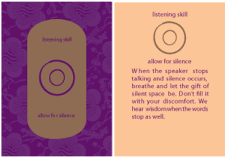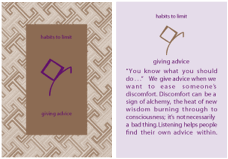Pre-Mini Listening Tutorial
Diagnostic Questions:
You already know a lot about listening, what makes for good listening and doesn't.
Answer the following questions about your experience on paper or to another:
1) What makes you want to learn to listen better? What do you think it will do for you?
2) Who is someone you can't stand talking to? Why? What do they do that lets you know they aren't listening?
3) What behaviors do you have that aren't really listening?
4) Who is someone you seek out, if only in your imagination, to listen to you when you have an issue to discuss? What specific behaviors do they do (body, words, energy?)
5) What happens for you when someone really listens to you?
6) How much are you like this person when you listen?
7) What do you, personally, need to do less of when listening?
8) What do you, personally, need to learn how to do when listening?
9) Are you prepared to become self-conscious for a while of your ineffective listening while you work at becoming a better listener?
10) Is there anyone you would like to share this learning with, perhaps a learning partner?
Steps to becoming a better listener:
Become an "inner listener":
Practice becoming aware of the sounds in your world, attuning your ears and your hearts to the complexity and beauty all around you.
Be in silence more, without any electronic distractions.
Become aware of sensations in your body caused by an emotional reaction to something. Observe the feeling without analyzing or trying to make it go away (it will just from being observed!)
Try having days where you don't talk much, but are silent or just nod in response, saying only what you have to say.
Observe your own listening. Become aware of your habits that block someone's feeling heard, before, or instead of speaking.
Allow more silence in a conversation and see what happens.
When listening to another:
Practice improving your listening in this order, layering the skills one upon the other over time:
Listen silently, nodding, but resisting the urge to interrupt or fill the silence. During this time you can observe what you feel compelled to do (compete, minimize, daydream, rehearse, etc.)
Just reflect back after listening silently. Let the other person know what you heard them say.
After reflecting back, ask questions to clarify information for yourself, then to help them understand or appreciate themselves more deeply.
Habits to Limit
The most common habits which block listening are on the "Habits to Limit" cards.
Download or order a deck.
Pick out and carry with you the cards which describe your own habits.
Listening Skills
Study the "Listening Skill" cards in the deck you have purchased.
Choose the skills you still need to learn the most, or which call to you first. "Allowing Silence" is a good place to start.
Learn only one Skill, and limit one Habit at a time, over the course of a week. Keep these cards with you all the time, or tape them up where you are reminded.
|
Thoughts on Learning to Listen
Remember when you listen that each person has the wisdom inside to guide their own lives, but when they are flooded with emotion they need the help of a listener to diffuse the emotion and organize their thoughts.
• We each have our own unique lessons to learn and we must learn them for ourselves. If someone does it for us, we still have to learn the lesson.
• Acknowledge that becoming a real listener will take a while, like learning a new language. Few of us have ever been taught how to really listen.
• Note the difference in the responses you get when you really listen to someone from when you are not.
• Seek out good listeners yourself and closely observe what they do and how you respond.
• Commit fully to learning to become a good listener. Commitment is 50% of mastery.
• Learn to listen with a friend, partner, or child, making a fun game of it.
• Forgive yourself and others when you or they fail to listen. We don't have to be "on" all the time. We are still going to be ourselves. Really listening is just another tool in your bag for relating better to other people.
Steps Steps for Listening Deeply
Decide to listen
• If you can't, say no or when
• Take care of anger first
• Limit distractions
Breathe into the belly
• Become aware of your body
• Minimize defensive posture
• Open your body as comfortable
• Turn toward them or 3/4
• If heated, put topic off to the side
Focus
• Become present
• Let interfering thoughts drop away
Allow for silence
• Silence is the well of answers
• Don't fill pondering time
• Allow 7 seconds after a question
• Breathe through discomfort
Reflecting back
• The basics of their story: details, ideas
• Their feelings
• What's important to them
• To help them organize thoughts
• To help them feel heard
Ask questions to help you
each understand
• To clarify the details
• To help them hear what they are saying
Limit your blocking habits
(available on "Listening Cards")
• Laugh at yourself
• Admit to the other person
|
|
Tactics for learning to listen:
Three tactics that help you overcome old habits and begin practicing new ones are:
Breath when you become tense, distracted or compelled to engage in an old habit;
Be mindful of your thinking and check for any thoughts of judgment, advice, or comparison;
Bracket, or temporarily set aside your own issues and opinions to experience the speaker's world as it is for him, not for you.
In short, when you begin to listen, think "set myself aside, mind my thoughts, and breathe (when I am tempted to take over)." |
|
How to use The Listening Cards
using examples from the deck:

Learning a new listening skill:
Let’s say you have chosen the card “Allow for
Silence.” First you set an intention, saying to
yourself, and perhaps to someone close to you:
“I allow for silences in conversations. When
another person stops speaking, I will take a
breath and allow what they have said
to seep in, allowing for them to think
deeper and me to more deeply take in
what they have said.” During the course
of the week, in each conversation you have,
make this your only goal, to allow for silence.
Take note of what makes this difficult for you
and address that within you. Also take note,
however, of what happens to the other person
when you are silent. Do they seem to have more
to say or find the solution to their own problem?
Do they say something next that surprises you?
Is there more peace between you? Often we find
out more about another person when we are
silent, instead of inflicting/interjecting our
own story or opinion. Try it.

Limiting an old listening habit:
Let’s say you have chosen the card, “Giving
advice.” You have chosen this card because
you are the King or Queen of Advice. Any time
someone tells you a problem, you jump right
into telling them what you would do, have done,
what they should do, who you know, etc. Despite
the fact that few people ever take your advice,
you habitually persist in doing this. Now you
wish to stop this habit. First, like above, you set
a simple positive intention, like “I help people
find their own advice rather than give it
automatically.” The next time someone comes
to you with a really juicy problem, and you catch
yourself salivating to advise, take a breath deep
into your belly, feel your heart beating in your
chest, focus on the person speaking, and let the
impulse to blurt out all that you know fly away,
like an old black crow. Instead, be silent, let
them talk, and instead of advice, ask them
what they think they will do, what ideas to
they have, or what have they done before when
faced with similar dilemmas. They will
eventually solve their problem on their
own and most likely thank you for listening. |

